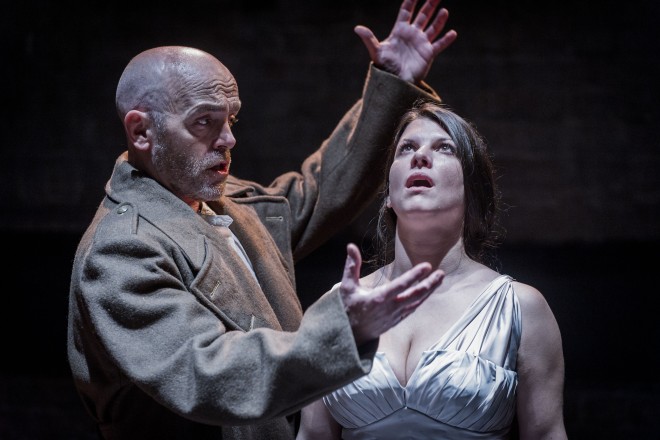It is a wonderful thing to have the inadvertently selective seats of an Opera performance made available and potentially appealing to a general audience. The availability side of things has been tackled by the Arcola’s Grimeborn Festival, which for nine years has been opening its doors to a wide range of more experimental Opera shows for a refreshingly accessible price. The appealing side has to then be ingeniously approached by the varied selection of Opera makers using the Arcola’s studio spaces, the performers and their wits as vessels. With a performance of Richard Strauss’s Daphne (and a libretto written by Joseph Gregor), it is Jose Gandia as the director and conductor that puts on an enjoyable but in no way extraordinary performance that I have had the chance to see.
Daphne tells the story of a young maiden whose love for nature and resulting indifference for the romantic advances of childhood friend Leukippos and even that of the sun god Apollo, lead to a conflict which results in the Olympian killing Leukippos and then turning Daphne into a tree as a form of redemption. The plot is mediocre at best (Strauss himself would be hard-pressed to disagree, not particularly being a fan of Gregor) but rather to his disadvantage, Gandia decides to place the action in Nazi Germany, adding a redundantly superfluous and inadequate layer to the piece. Adaptations like this succeed only if you have at least a hint of relation to the concept, which isn’t the case, and the Holocaust eventually becomes an excruciatingly predictable theme for artists who are too lazy to look elsewhere for inspiration and impact.
The limitations and/or possibilities of a studio space almost certainly will always involve a piano reduction, placing the weight of the performance solely on the opera singers, the scenic elements and the interaction of these two. In this particular show it seems to rely mostly on the singers, since the scenic elements such as lighting and set do not go out of their way to adapt to the space creatively. The only two circumstances in which the visuals adapt are when Apollo is perched on a sort of corner platform, obviously symbolising Mount Olympus and his godly status, and the drapes hanging upstage left, representing the trees and nature. The latter is the one scenic factor that has an actual effect and intention, namely the addition of a vertical layer, expanding Daphne’s beloved nature onto the heavens and circumstantially giving the Lighting Designer something to play with from time to time.
With the aid of performances such as Justine Viani’s Daphne, John Upperton’s Apollo, and Marta Lopez’s ambitious piano playing, it is fair to say that the show reachs a certain standard. Disappointingly, these are weighed down by an unimaginative theatric technique and a lack of prosody and personality in the visual front. 3/5
Review written by Bryan Novelo.
Daphne was shown at the Arcola Theatre as part of this year’s Grimeborn Festival on Thursday 20th August. For more information on this year’s festival, visit here…



Leave a Comment